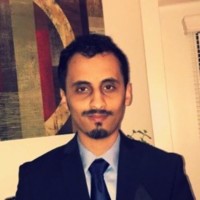Theta Phase-Specific Closed-loop Stimulation in Implantable Neuromodulation Devices

Speaker: Ahmed Alzuhair
Affiliation: UCLA Ph.D. Candidate
Abstract: Deep brain stimulation (DBS) is increasingly used to mitigate a variety of brain disorders, which is driving the interest in understanding and creating the optimal conditions for delivery of stimulation pulses. Generally, therapeutic DBS is open-loop, with limited sensing in epilepsy devices. Epilepsy monitoring is a welcoming clinical environment to study science of human memory, where encoding and retrieval of information occur at a specific phase of Theta-band brain waves. Beside treating epilepsy, there is a growing interest in using DBS for memory restoration. Stimulation could be more efficacious if we incorporate knowledge of the memory encoding or recall state to inform the stimulation decision process. It was shown that DBS enhances or inhibits memory when delivered at specific phases of the Theta rhythm.
Early Theta phase-locked (PL) experiments were fully supervised in the lab, and methods inaccuracies were overcome by repeated experiments. Later, efforts were made to realize real-time PL in software; these methods are supervised, requiring subject-specific complex optimization and manual settings, in addition to the high computational complexity. This work enables unsupervised, implantable size and power, phase-specific stimulation, closing the gap between implantable analog front-ends (AFE) and stimulation engines for smarter closed-loop control. Furthermore, compared to continuous stimulation, delivering stimulation pulses only when it matters results in an overall system power savings. This is crucial to implantable devices, since it translates to a smaller battery-size requirement or less frequent surgery for battery replacement.
To facilitate clinical studies and accelerate IC validation towards an implantable system, the PL IC is integrated with an AFE and a stimulation IC’s in a small-scale hand-held platform. The closed-loop stimulation functionality has been verified in-vitro in preparation for clinical studies. The platform features a graphical user interface for clinicians to design the closed-loop stimulation protocol parameters, such as targeted phase and the stimulation intensity for Theta-synchronized stimulation delivery. Therefore, facilitating a wide range of experiments that can, hopefully, bring us a step closer to restoring and enhancing memory.
Biography: Ahmed Alzuhair is a Ph.D. candidate in Prof. Dejan Marković Parallel Data Architectures Group in the Electrical and Computer Engineering Department, UCLA. Ahmed’s research focuses on the design of efficient hardware and signal processing algorithms for biomedical applications. In 2013, he was the recipient of King Saud University fellowship. Ahmed received the B.S. in Electrical Engineering from King Fahd University and M.S. in Electrical Engineering from UCLA, in 2011 and 2015, respectively.
For more information, contact Prof. Dejan Marković (dejan@ucla.edu)
Date/Time:
Date(s) - Jan 22, 2019
12:00 pm - 2:00 pm
Location:
E-IV Faraday Room #67-124
420 Westwood Plaza - 6th Flr., Los Angeles CA 90095
